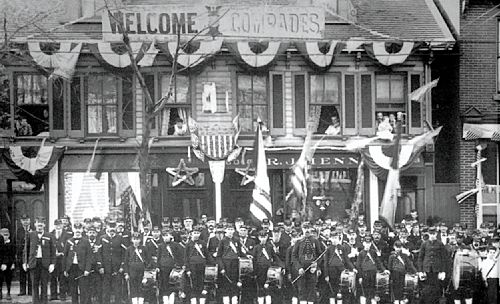
History Festival to Mark East Liberty’s Past

In this photo taken in the 1890s, Civil War veterans participate in a reunion in front of a building on Penn Circle South that is still standing in East Liberty. The past of the East End/East Liberty area will be celebrated during Saturday's first-ever East Liberty History Festival. Courtesy of the East End/East Liberty Historical Society
Public knowledge of East Liberty’s past is stuck on urban renewal, high-rises and crime. But that era was a blip.
East End history buffs hope to put the past in perspective Saturday at the East Liberty History Festival, a first-time event in a neighborhood of firsts.
What most people don’t know about East End history — with East Liberty at its hub — would overflow the parking lot at Eastminster Presbyterian Church, but the day-long event of the East End/East Liberty Historical Society has been designed to fit there, for free, from 10 a.m. to 7 p.m.
From Indians and traders to the first immigrant settlers, the festival will highlight the progression of development and industrial change that brought unparalleled prosperity to the area. In a recent Arcadia “Images of America” publication, the title “Pittsburgh’s East Liberty Valley” was chosen to encompass the breadth of East Liberty’s influence.
Historical society members who put the book together said many images that would today be in Shadyside or other adjacent neighborhoods were then described as East Liberty.
“On the old postcards, East Liberty went all the way up to Fifth Avenue,” said Marilyn Evert, a member of the historical society and director of development at Homewood Cemetery. When East Liberty began its slump in the 1970s, she said, “people began to disassociate themselves.”
Al Mann, a retired chemical engineer from Highland Park, has been at the helm of planning the festival for the past year as the society’s president. In a bag behind the driver’s seat of his car, he has been carrying around items for display, among them a large aluminum mold of an Easter bunny.
The mold was used at Bolan’s Candies in East Liberty, the first of the family’s several stores, open on Penn Avenue from 1918 until several years ago.
“We have a lot of firsts,” said Mr. Mann. The first commercial oil refinery in the nation was in Highland Park, and the society has the papers to prove it. The first radio broadcast of a church service was from Calvary Episcopal in Shadyside in 1921. The nation’s first drive-up gas station was at Baum Boulevard and St. Clair Street. Pittsburgh’s first traffic light was at Highland and Penn avenues.
Festival highlights will include re-enactments of processes developed by industrialists who lived or did business in the East End.
Charles Honeywell, executive director of the historical society, will demonstrate iron and aluminum production using small furnaces. “The blast furnace will produce iron from iron ore, coke and limestone, just like the big ones. Superheated 3,000-degree iron will pour out into a mold that people can see.”
Aluminum will be melted in a small crucible furnace and poured into medallion molds with street car emblems. Those will be sold to the public.
Bus tours throughout the day will take people to points of interest that include the Highland Park reservoir, a Negley family burial marker, grand churches, the Kelly-Strayhorn Theater and a house that encases a log cabin built in 1794.
Exhibits will show the historic transitions of Calvary and St. Andrew’s Episcopal churches and a wall of fame reproduced from panels in the Kelly-Strayhorn. The photos of performing artists and other celebrities attest to the role the East End played as a breeding ground for the entertainment industry.
Ms. Evert said her interest stems from working and worshipping in the East End. She lives in Fox Chapel.
When the society formed in 2002, she said, it was in part to interest people in the East End’s future.
“The idea was that if people became aware of their history and where they came from, that would be conducive to development. It has such an extraordinary history. It’s unbelievable the things that came out of this one place.”
